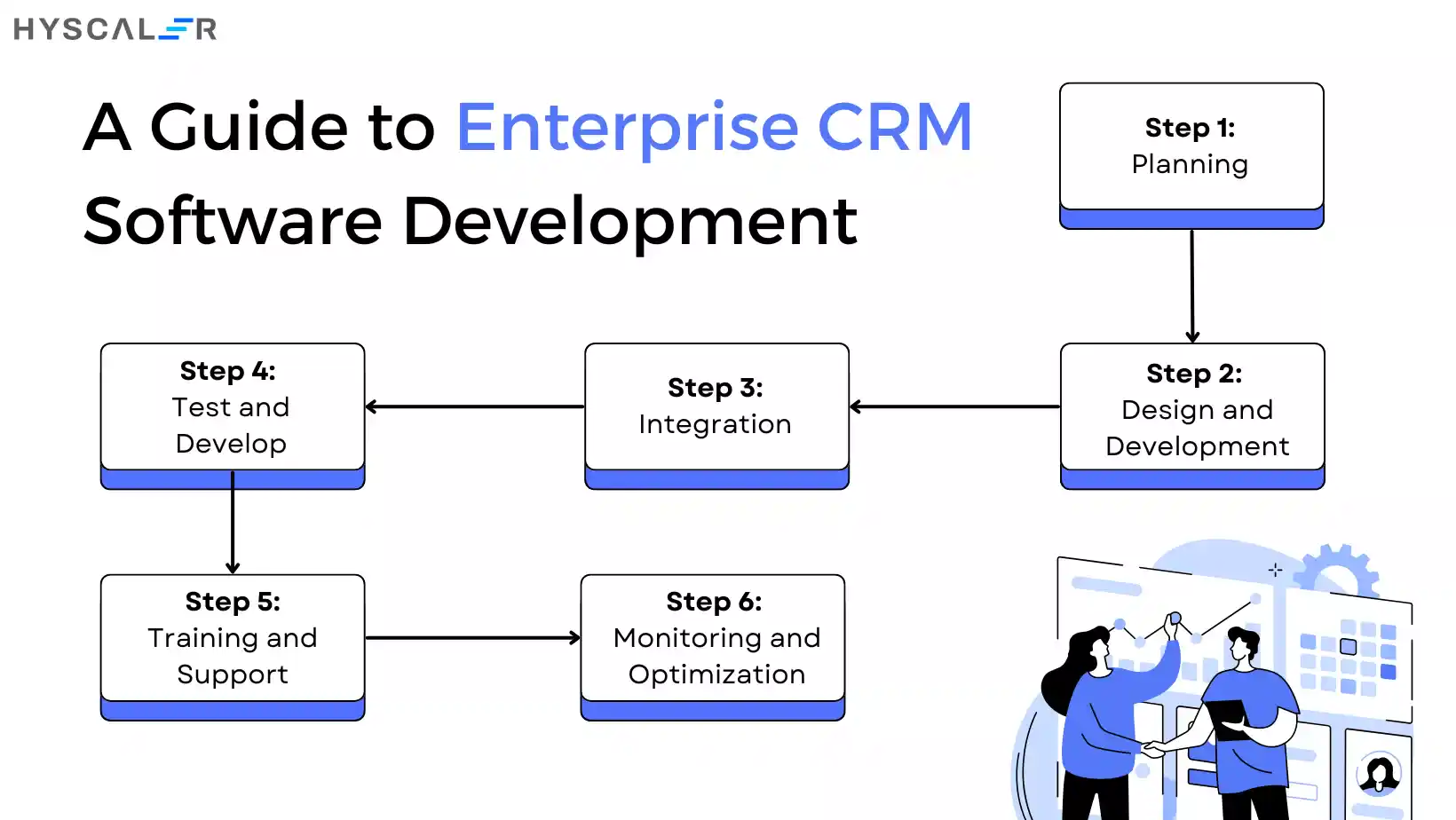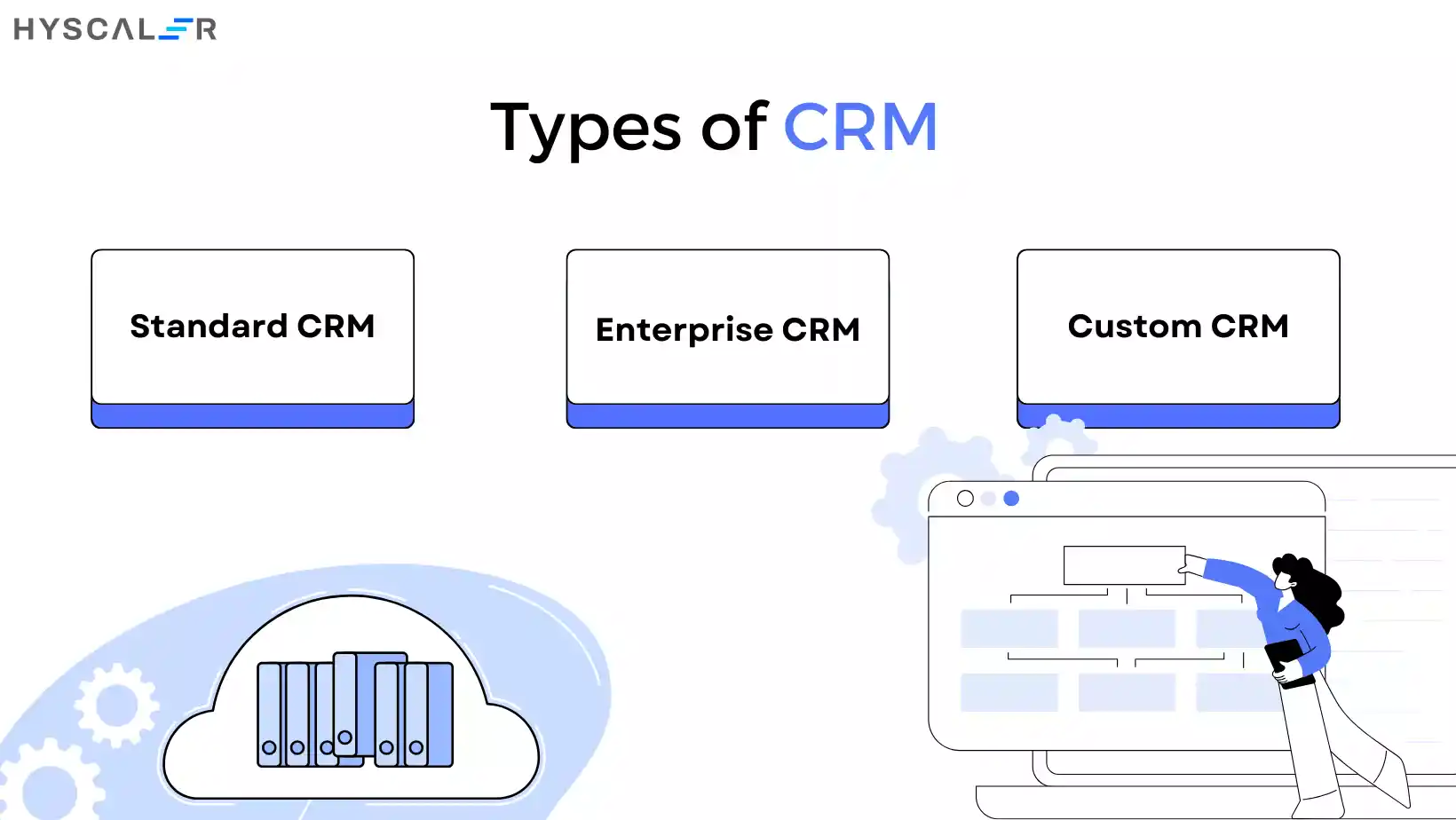Table of Contents
What is Enterprise CRM Software?
Enterprise CRM (Customer Relationship Management) software is a sophisticated tool designed to manage and optimize interactions with customers and prospects across large organizations. This software provides a centralized platform to store customer information, track interactions, and analyze data to enhance customer satisfaction, loyalty, and business performance.
Unlike standard CRM solutions, enterprise CRMs are equipped with advanced features like sales force automation, comprehensive analytics, marketing automation, and customer service management. These capabilities make them ideal for managing the complexities and scale of large enterprises.
By integrating all customer-related processes and data into a single platform, enterprise CRM software helps businesses streamline operations, improve communication across departments, and make data-driven decisions. To achieve seamless connectivity and automation, professional Salesforce integration assistance is recommended for linking Salesforce with other essential business systems. The ultimate goal of an enterprise CRM is to foster stronger customer relationships, boost sales, and enhance overall organizational efficiency.
A Guide to Enterprise CRM Software Development

Developing a custom enterprise CRM solution is a strategic endeavor that can significantly enhance your business operations with sales process automation.
Here’s a step-by-step guide to help you navigate the process of creating a tailored enterprise CRM:
Pre-Planning and Requirement Gathering: Start by identifying your business needs and goals. Gather detailed requirements from all stakeholders to ensure that the CRM solution addresses all necessary functionalities. This step is crucial for setting clear objectives and laying the foundation for a successful project.
Design and Development: Design the architecture of your CRM system, focusing on scalability, security, and usability. Develop the user interface with an emphasis on providing a seamless user experience. Implement the necessary features and functionalities as per the gathered requirements.
Integration: Integrate the CRM solution with existing systems and tools used in your organization. This integration ensures a smooth flow of information and processes across different departments, enhancing overall productivity, whether it’s connecting marketing platforms, ERP systems, or enabling seamless document management through Salesforce SharePoint Integration.
Testing and Deployment: Conduct thorough testing to identify and fix any bugs or issues. Ensure that the CRM system performs optimally under various conditions. Once testing is complete, deploy the CRM solution across your organization.
Training and Support: Provide comprehensive training to all users to ensure they can effectively use the CRM system. Offer ongoing support to address any issues and make continuous improvements based on user feedback.
Monitoring and Optimization: Continuously monitor the performance of the CRM system and make necessary optimizations to ensure it meets evolving business needs.
Benefits of Integrating a CRM App in Businesses
- Superior Visibility: Enhanced customer tracking capabilities within your CRM can further improve this visibility, allowing for a more precise analysis of customer behaviors and needs. This visibility helps in making informed decisions and optimizing business strategies.
- Increased Profits: With advanced data analytics and automation functionalities, enterprise CRM systems such as dynamics 365 business central can enhance decision-making processes and improve sales efficiency, leading to increased profits. They help in identifying high-potential leads, optimizing sales funnels, and improving conversion rates.
- Improved Customer Experience: Enterprise CRM software enables organizations to understand customer needs better and tailor products or services accordingly. This personalized approach maximizes customer retention and lifetime value while reducing churn rates.
- Cross-Team Collaboration: An enterprise CRM system acts as a unified data repository, allowing different teams to share information and coordinate their efforts throughout the customer lifecycle. This collaboration ensures that all departments are aligned and working towards common goals.
- Enhanced Efficiency: Automation of routine tasks and streamlined processes reduce the workload on employees, allowing them to focus on more strategic activities. This efficiency leads to better resource utilization and overall productivity improvements.
- Data-Driven Decisions: Enterprise CRMs provide valuable insights through comprehensive data analysis, helping businesses make data-driven decisions. This analytical approach enhances strategic planning and drives business growth.
Types of CRM

Standard CRM
This type of CRM offers essential organizational features to manage and automate customer interactions. It’s suitable for various industries and helps streamline marketing, sales, and customer service processes. Standard CRMs are ideal for small to medium-sized businesses looking for basic functionality.
Enterprise CRM
Designed for large organizations, enterprise CRMs provide a comprehensive solution with advanced features to meet the complex needs of big companies. These systems offer extensive automation, data analytics, and integration capabilities, ensuring smoother operations across multiple departments.
Custom CRM
Custom CRMs are tailored to the specific needs of an organization. They are either developed in-house or outsourced to a third-party developer. These systems are ideal for businesses with unique and complex sales models that require specialized functionalities. Custom CRMs offer maximum flexibility and can be adapted to changing business requirements.
Key Features of Enterprise CRM Features
Enterprise CRM tools come equipped with a wide range of features designed to meet the needs of large organizations. Here are some key features:
Sales Management:
- Contacts Management: Maintain a centralized database of all customer contacts, including detailed interaction histories.
- Salesforce Automation: Automate sales processes, including lead management, opportunity tracking, and sales forecasting.
- Sales Pipeline: Visualize and manage the sales pipeline to track the progress of deals and identify bottlenecks.
- Analytics and Reports: Generate detailed reports and insights to track sales performance and identify trends.
Marketing Management:
- Customer Segmentation and Profiling: Segment customers based on various criteria to create targeted marketing campaigns.
- Personalized Marketing: Deliver personalized marketing messages and offers to individual customers.
- Marketing Automation: Automate marketing tasks such as email campaigns, social media posting, and lead nurturing.
- Customer Journey Mapping: Map out the entire customer journey to understand and improve customer experiences.
Customer Service Management:
- Personalized Services: Provide personalized support and services to customers based on their preferences and history.
- Automated Customer Services: Implement automated chatbots and self-service portals to handle common customer queries.
- Uninterrupted Assistance: Ensure 24/7 customer support through various channels, including phone, email, and live chat.
Impact of AI on CRM
Artificial Intelligence (AI) is transforming the CRM landscape by introducing advanced capabilities that enhance the effectiveness and efficiency of customer relationship management. Here are some ways AI impacts CRM:
- Predictive Analytics: AI algorithms can analyze historical data to predict future customer behavior, helping businesses anticipate customer needs and make proactive decisions.
- Automation: AI-powered automation can handle repetitive tasks such as data entry, lead scoring, and follow-up emails, freeing up employees to focus on more strategic activities.
- Personalization: AI can analyze customer data to deliver highly personalized experiences, from product recommendations to tailored marketing messages.
- Customer Insights: AI-driven analytics provide deep insights into customer preferences, behavior, and sentiment, enabling businesses to make data-driven decisions.
- Improved Customer Support: AI chatbots and virtual assistants can provide instant support to customers, resolving common queries and issues without human intervention.
Why Small Businesses Should Implement CRM Software
- Automation: CRM software automates routine tasks, such as data entry and follow-up emails, allowing small businesses to operate more efficiently and focus on growth activities.
- Customer Satisfaction: By providing a centralized platform for managing customer interactions, CRM software helps businesses deliver better customer service, leading to higher satisfaction and loyalty.
- Project Management: CRM project management tools can streamline workflows by providing a clear overview of tasks, deadlines, and progress, ensuring that projects are completed on time and within budget.
- Sales Automation: Automating sales processes such as lead management, opportunity tracking, and sales forecasting helps small businesses improve sales efficiency and close deals faster.
- Data Management: CRM software centralizes all customer data, making it easier to track interactions, analyze trends, and make informed decisions.
Requirement Analysis: Do you need a Standard CRM or an Enterprise CRM?
Choosing between a standard CRM and an enterprise CRM depends on the size and complexity of your business operations. Here are some factors to consider:
- Business Size: Small to medium-sized businesses with straightforward needs may find a standard CRM sufficient. In contrast, large organizations with complex processes will benefit more from an enterprise CRM.
- Functional Requirements: Evaluate the specific functionalities you need. Standard CRMs offer basic features, while enterprise CRMs provide advanced capabilities such as sales force automation, marketing automation, and comprehensive analytics.
- Scalability: Consider your future growth plans. Enterprise CRMs are designed to scale with your business, accommodating increased data volume and more complex processes.
- Customization: If your business has unique requirements, a custom CRM may be the best choice. Custom CRMs can be tailored to fit your specific needs and adapted as your business evolves.
- Budget: Enterprise CRMs are typically more expensive than standard CRMs due to their advanced features and scalability. Assess your budget and determine which option provides the best value for your investment.
HyScaler’s CRM Services
Consulting
At HyScaler, we offer expert consulting services to help you select and implement the right CRM solution for your business. Our consultants work closely with you to understand your unique needs and provide strategic advice to ensure the successful adoption of a CRM system.
Custom Enterprise CRM Software Development
Our team of experienced developers specializes in creating custom enterprise CRM solutions tailored to your specific business requirements. We provide end-to-end development services, from initial consultation and requirement gathering to design, development, integration, testing, and ongoing support. Our custom CRM solutions are designed to be robust, scalable, and secure, ensuring that they meet your business needs and drive growth.
Embrace the power of a custom enterprise CRM solution with HyScaler to streamline your business operations, enhance customer relationships, and drive growth. Our team of experts is ready to help you develop a CRM system that meets your unique needs. Contact HyScaler today to embark on your journey towards a more efficient and effective CRM strategy. With our comprehensive services, you can ensure that your CRM implementation is successful and delivers the desired results. Let us help you take your business to the next level with a custom enterprise CRM solution tailored to your specific requirements.